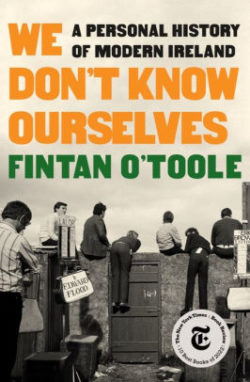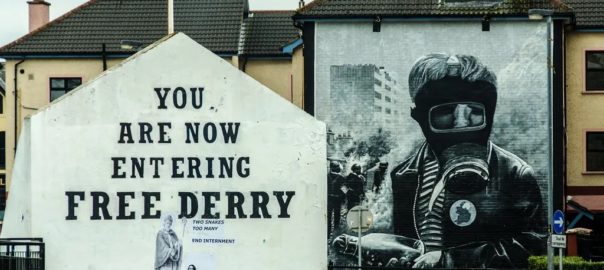Podcast: Play in new window | Download
Subscribe: Apple Podcasts | RSS
We talk with Fintan O’Toole about his scathing — and tender — personal history of modern Ireland, We Don’t Know Ourselves. Then we hear Seamus Heaney reading a poem and a rare recording of storyteller Susan Porter reading from the Irish legend of Cuchulain.
Writers Voice— in depth conversation with writers of all genres, on the air since 2004.
Like us on Facebook at Writers Voice with Francesca Rheannon, on Instagram @WritersVoicePodcast or find us on Twitter @WritersVoice.
Love Writer’s Voice? Please rate us on your podcast app. It really helps to get the word out about our show.
A Personal History of Modern Ireland
As a journalist and critic for the Irish Times since 1988, Fintan O’Toole has had a front row seat on Ireland’s cultural, political and economic transformation from European backwater to center of global business.
 His bestselling book, We Don’t Know Ourselves: A Personal History Of Modern Ireland, is unsparing in its critique of those who ruled the country. But it’s a critique founded on a profound love for his long-beleaguered compatriots. And O’Toole draws a cautionary lesson for us here in the US, as the lines separating Church and State become ever more eroded.
His bestselling book, We Don’t Know Ourselves: A Personal History Of Modern Ireland, is unsparing in its critique of those who ruled the country. But it’s a critique founded on a profound love for his long-beleaguered compatriots. And O’Toole draws a cautionary lesson for us here in the US, as the lines separating Church and State become ever more eroded.
The Irish Theocracy
When Fintan O’Toole was born in 1958, Ireland was perhaps the poorest country in Europe. Most of its people scrabbled out a meagre living on the land. The country’s main export, aside from cattle, was its own youth; facing bleak prospects at home, young people fled abroad to England, America and elsewhere in droves.
“Religion and politics are pretty important things in and of themselves, but when you fuse them into a single identity, it actually becomes pretty toxic.” — Fintan O’Toole
Ireland was also in the grip of what can only be described as a theocracy. The Catholic Church ruled over the most intimate aspects of people’s lives: the family, reproduction, sexuality, education and healthcare. Anything that violated the strict dictates of the Church was severely punished — except, of course, for the pedophilia rampant among the priesthood, which was ignored. Corruption reigned in both Church and State.
The Irish Tiger
Now Ireland is a global center for the technology and pharmaceutical industries. Abortion and gay marriage are legal. The gender apartheid that reigned of old has been overturned. Much has changed, although the Irish Tiger’s neoliberalism hasn’t put an end to corruption—it’s just altered the playing fields.
About The Author
Fintan O’Toole is a columnist for the Irish Times and teaches at Princeton University. He was drama critic for the New York Daily News, as well as the Irish Times, and is a regular contributor to The New York Review of Books.
A New York Times Bestseller, We Don’t Know Ourselves was named among the 10 best books of 2022. It’s now out in paperback from W.W. Norton.
Seamus Heaney’s Poem “Whatever You Say, Say Nothing”
Susan Porter, the Story of Cuchulain
During the 1960s hippie heyday of Big Sur, California, the storyteller Susan Porter recorded an album of Stories from Irish Mythology. Francesca’s father, Guido Teunissen, lived on Porter’s property in a house on a promontory overlooking the Pacific Ocean. She has in her possession a cassette tape of Porter’s album, sent to her by her father. We hear a clip from the story of Cuchulain, read by Porter. The audio quality is faded — but that only adds to it air of mystery.

